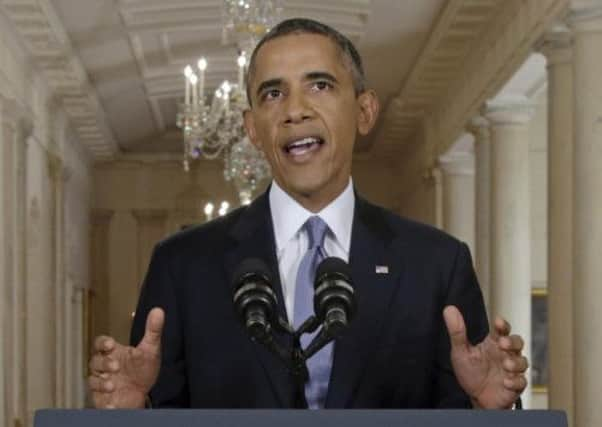Ted Bromund: Dictators and despots call Obama’s bluff over his war of empty words


It says much about Obama that, when news of Syria’s large-scale use of chemical weapons broke in August, he described it as “troublesome”.
The gassing of hundreds of children is beyond troubling for most people. But for the President, whose priority has been to avoid making foreign policy an issue, it was indeed troublesome – for him – that he could no longer let the issue slide. His red line, which he had hoped would allow him to stay out of Syria, now threatened to pull him in.
Advertisement
Hide AdAdvertisement
Hide AdHis administration immediately tried to engage the brakes. Defence Secretary Chuck Hagel said: “If there is any action taken, it will be [in] concert with the international community.” Obama fell all over himself to set conditions – he dismissed “folks [who] call for immediate action”, warned against “jumping into” Syria and referred vaguely to “rules of international law” and the illegality of attacking “another country without a UN mandate.”
All that, too, was just words. There was no concerted move by the international community, other than to run away from Obama as fast as possible. It turned out that the only one calling for immediate action was the President himself.
When it became obvious that there was not going to be a UN mandate, that turned out to be optional, and the President quickly grabbed at the idea that “international norms” allowed or even compelled US action.
Or, apparently, they did not. And the still-to-be-defined Russian proposal that rescued the President promises nothing but disaster.
Advertisement
Hide AdAdvertisement
Hide AdIt is a deal cooked up in the dark between a secretive autocracy and a murderous dictatorship. Russia itself is in violation of the Chemical Weapons Convention and is a major Syrian arms supplier.
The only reason Assad can have for giving up the nerve gas that keeps him in power is a quiet Russian assurance that they will find other ways to ensure he wins his civil war.
The deal re-inserts Russia as a major player in the Middle East, a region from which they were largely ejected at the end of the Cold War. Russia’s gains from this fiasco are clear, and Vladimir Putin gets the additional delight of lecturing the US about Russian fidelity to international law and its love of peace and freedom.
Meanwhile, Obama’s declaration – now more than two-years-old – that “Assad must go” has been entirely forgotten. More meaningless words.
Advertisement
Hide AdAdvertisement
Hide AdThe deal continues a painful pattern of the USA asking Russia for favors. We begged them to sign the New START treaty so that we could reduce our own nuclear stockpile (the treaty requires no Russian cuts at all). The Russians graciously complied. We asked them if they would kindly not sell advanced anti-aircraft missiles to Iran. They keep us on the hook by regularly renewing the offers to Iran, but never quite carrying through.
We don’t even bother to ask Russia if they would be so pleasant as not to use Interpol to harass American citizens, and of course they keep on doing it.
Selling missiles to Iran would be a commercial win for Russia. But, far more important to Putin, the US is treating Russia as an equal – in fact, a superior – nation, one to which it has to run for permission when it wants to do anything, and one that gets it off the hook when it blunders into difficulties. That both constrains the US and advances Putin’s goal of returning Russia to the place it occupied in the international system before the fall of the USSR.
Russian weaknesses are so systemic that this goal is beyond Putin’s reach. But that does not prevent him from making a fool of us. Our problem is that we always place ourselves in the position of the suppliant. That is inevitable, given the fact that Obama wants nothing more than a quiet life abroad. Russia has the power to cause trouble, and the Kremlin is willing to use it. We therefore have to keep on asking the Russians not to make difficulties, and they have no reason to comply.
Advertisement
Hide AdAdvertisement
Hide AdAfter all, if it had not been for Russian support of Assad over the past two years, he would likely have lost his war by now. Obama would not even have had the chance to gaffe his way to the Russian lifeline. As long as we show a relentless lack of determination in world affairs, that pattern will continue.
The Russian role in the Syrian crisis is thus not the really dangerous part of the affair. The true danger lies in the fact that, once again, President Obama has shown that he has no staying power at all. He quit in Iraq, because that was supposedly the wrong war. Afghanistan was, he said, the right one.
Well, we are quitting there too. But Libya is the right war: the US needs to “stand alongside” the Libyan people. A murdered ambassador later, and the administration ignores Libya. Mubarak is an ally and Assad is a reformer. No, they both have to go. Syria is the right war. No wait, it’s not. We have a red line on the Iranian nuclear program, but we are pivoting to the Pacific even as we cut the US Navy.
All this is nonsense, but dangerous nonsense, because it is all words. No one – not the Russians, not the Chinese, and not the Iranians – has any reason to believe that when we make a commitment, we will follow through. And that means we will keep on being tested until, at some point, we find ourselves faced with a crisis we cannot just talk away.
*Ted R. Bromund is a senior research fellow in Anglo-American Relations, based atThe Margaret Thatcher Center for Freedom at The Heritage Foundation in Washington.